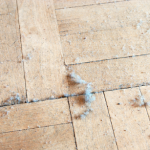Keep Indoor Air Clean During National Wellness Month
August is National Wellness Month, so it's time to take inventory of all of the things that contribute to health and wellness in people's lives. The air that people in a home are constantly breathing is an especially important thing to consider, especially in the wake of a global pandemic centered around a respiratory virus.
When it comes to ensuring that wellness is prevalent in a home, protecting the air inside is crucially important. Unfiltered and low-quality air can contribute to several conditions that inhibit the wellness of the body. During National Wellness Month, homeowners should take a moment and assess the air inside their homes. With this information from local air quality specialists, homeowners can better protect people's health in their homes.
Defining Indoor Air Quality
Indoor air quality, or IAQ, is a measurement of contaminants in indoor air that can adversely affect human health. There are two main considerations when thinking about IAQ. First, suspended particles in the air make up a significant threat to human health. Particles that hang in the air contribute to everything from bad odors to biological threats that cause illness.
The second ingredient in the air that influences indoor air quality is the amount of humidity present. Humidity that is either too high or too low can dramatically affect the health of people living in a home.
Both aspects of indoor air quality are intended to be controlled by central air conditioning systems, but there are conditions under which a normal AC can't keep healthy air supplied.
What's Lingering in Indoor Air?
Some of the things that contribute to poor air quality in indoor air are:
- Odors and oils from cooking
- Volatile organic compounds from aerosol products and cleaners
- Dust from the outdoors and dead skin cells from a home's occupants
- Radon and poisonous gases seeping from underground
- Pet dander
- Mold from uncontrolled humidity
The Health Implications of Poor Indoor Air Quality
Knowing what is lingering in indoor air makes it easy to see why it could be a problem. But, what are the specific problems caused by being constantly exposed to poor indoor air quality?
Some of the consequences of not have good indoor air quality are:
- Mold toxicity from uncontrolled humidity and the resulting damage the mold can cause to drywall and wooden studs in a home
- Ruined wood furniture and flooring from expansion and contraction that is the result of swings in humidity
- Being constantly plagued by sinus infections, allergies, and asthma complications
- Dry, itchy, and irritated skin and eyes
- Spreading bacteria and viruses through persistent infections
Luckily, by taking a few extra steps, one can avoid these consequences. Consult with local HVAC technicians to learn how to fix air quality problems in any home.
About Temp Engineering
Temp Engineering proudly serves its neighbors in Miami Lakes, FL. Their honest pricing, expert workmanship, and superior customer service have earned them the trust and satisfaction of their customers. Call now for indoor air quality services!



























